The High Sierra
the endless pursuit of the beautifully intense
I’m deep in the middle of a dream when I hear a “eeeeee-oooooo!” howl that jolts me from mummy position in my sleeping bag into scrambling to gather my belongings. I didn’t bring my watch or phone with me into the wilderness, so this is my alarm. Pretty effective. From last night’s discussion, I know it must be just after 4:30 a.m.
I strap my headlamp around my beanie, zip open the tent fly, and dust off the ice flakes that formed on my backpack overnight. I join the other nine men at our designated “kitchen,” really just a flat area with a few rocks to sit on. While we take turns boiling water for our own rendition of oatmeal, I hold my hands around the camping stove’s flame, trying to stay warm at 11,700 feet in the Sierra mountains of California. It’s day three of our backpacking trip, and today we’re attempting to summit Mt. Sill.
Backpacking as Ritual
It’s hard to describe what backpacking means to me. It’s not quite a hobby or a passion. I don’t obsess over gear or dream about routes year-round. But when that narrow summer window opens, just after the snow has melted and before the storms arrive, I go. For some things like skiing or surfing, I can’t get enough. But with backpacking, one or two trips is all I need. In that sense, it feels less like recreation and more like ritual.
If a ritual is a practice of crossing from one world to another, then this is how I open a portal to a simpler, more intense way of living. The moment I leave my phone and wallet in the car, I step across a threshold. The weight of unread texts and emails is lifted and there’s a sense of freedom in knowing that there’s nothing to purchase, check on, or achieve. I’m just out there.
Out there, nothing is a distraction because everything matters. Wildflowers signal water. Distant clouds hint at rain, or worse. Sunlight itself can be a welcome blessing at dawn and a threat by late afternoon. You stop trying to be present and simply become so, because the environment insists on it.
Life gets simpler, but not necessarily easier. There’s no indoor temperature control, so you’re always adding or shedding layers. Your next move is dictated by the availability of water, the shifting weather, and how much daylight is left. You cook when you're hungry, sleep when you’re tired, and wake when the light returns.
When the sun goes down and you slip into your tent, falling asleep is near instant. There’s no need for a fancy evening wind down routine or melatonin gummy when you can actually listen to your body telling you it’s time to rest.
Urgency feels different here. It’s not the fake pressure of red notification bubbles or overdue emails. It’s simple and physical: get up the mountain before the sun gets too high, get back to camp before it gets dark. There’s no decision fatigue, no infinite list of options to analyze. Out here, the stakes are real and the needs are obvious. You know what matters, and that kind of clarity feels like strangely calming.
Synthetic Captivity
Now that I’m back, I notice how easily the conveniences of modern life can slip into control. What once felt like progress now feels like synthetic captivity. I’m grateful for the comforts: my bed, my fridge, transportation that isn’t just my feet. But I also see how these same comforts can dull the edges of experience. We’ve made life easier, but we’ve also made it too smooth. It’s so easy to split the bill at dinner that we all Venmo each other afterward, instead of figuring it out together at the table. It’s so quick to book an Uber that we’ve stopped asking friends for rides to the airport. Everything happens quickly, cleanly, and without friction. But friction is what gives us something to hold onto. When scrambling up steep walls of boulders, jagged edges are what keep you safe. You need the roughness to get a grip. Without it, you slide. Without it, life becomes so smooth you can’t hold on to anything.
I’m not trying to escape. I don’t want to live off-grid or make every day a test of endurance. But I do want to carry something back with me: a sense of how good it feels to live simply and fully, without any extra fluffy layers. I’m realizing that I don’t want a life of constant comfort, but one built with effort and imbued with aliveness.
When I think about a full life, comprised of many full days, it’s not one padded by endless ease. It’s one where I go to bed spent, and in the best way. Physically tired from moving through the world, mentally tired from pursuing something that matters. What’s strange is how often modern life delivers the opposite: a day of mental overdrive with no real movement, and still, somehow, the weight of unfinished tasks, unanswered messages, and a backlog of content waiting to be consumed. These days, it’s rare to end the day with your mind as quiet as your body is tired. The ongoing challenge I have presented myself with is to arrive at my bed each night feeling tired, fulfilled, and excited about tomorrow.
Pure Solitude
There’s being alone, like sitting in your apartment by yourself. Then there’s solitude, like going for a hike and spending time in your own head. But then there’s pure solitude. The kind you find deep in the backcountry, when you can’t see a single road, car, or skyscraper in the distance. It’s not just that you’re alone. It’s that nothing around you suggests the presence of other people. I might sound like a drug dealer promoting some purer version, but there’s really is something otherworldly about being that far removed from modern life.
I got a real taste of it on day four, when we spent the day in Palisades Basin.
The day before had been anything but peaceful. Climbing Mt. Sill was raw and exposed. The sun beat down hard, the air was dry and thin at 14,100 feet, and the ascent was a chaotic game of trying not to trigger an avalanche of rock. Every step required attention. We moved carefully, alert to every sound and shift beneath our feet, trying not to knock anything loose. It was the kind of environment where your body and your mind are entirely locked in.
The next morning, I woke up to the light and realized I had no water. I crawled out of my sleeping bag and hiked down a short but steep gulley to the nearest stream. At the bottom, the terrain had changed entirely. The sharp granite gave way to a soft, open meadow. The grassy fields were painted with yellow, red, and purple wildflowers. The sound of a running stream moved through the valley. I crossed it barefoot, stepping from the shady side into the sun. The warmth on my skin and the birdsong in the air made the whole area feel vivid with peace.
Later that day was our solo. Each of us spread out of view from one another for the entire day. In past trips, this kind of setting has dropped me into deeply meditative or contemplative states. But this time was different. I didn’t come away with realizations or insights. I also didn’t have anything major I was trying to figure out. Of course, there are still some big moving parts in my life, but nothing that felt urgent enough to bring to the mountains.
What I experienced instead was rest. I was so exhausted from the summit the day before that I kept closing my eyes the moment I sat or lay down. I moved between shady spots under pine trees and warm granite slabs, dozing off again and again, using my backpack as a pillow. I woke up once when a marmot ran across my arm, maybe thinking I was a rock or something edible. I also saw a hummingbird that day, zipping in midair with that high-octane energy that makes them seem like they exist outside of time.
In the afternoon, I wandered to a stream to fill up water and stopped to observe the wildflowers. I sat on a boulder overlooking the basin, scanning the sweep of mountains on the horizon and tracing the vertical rise from lush flowing valley to jagged granite peaks. Later, I spent time examining a pine tree, noticing clusters of red baby cones no bigger than M&Ms. Sometimes pure solitude opens the door to big internal shifts, but this time it didn’t. I napped with some trees, noticed some animals, drank some water, and ate some snacks. Nothing profound happened, but maybe that was the point. Some days, the most meaningful thing you can do is not try to find meaning at all.
When Money Doesn’t Exist
In the backcountry, everything is everyone’s. I borrowed a rain jacket and happily accepted other people’s trail mix, bone broth, and electrolyte mix. We all shared Jet Boil stoves, tents, bear-proof food sacks, and shovels that we used to dig holes for our poops. Normally, it might be kind of weird to ask another dude if you can use his chapstick, you know, because his lips have definitely touched the object you’re about to press to your own, but outside, no one gives a shit.
What’s interesting is how naturally this kind of sharing happens. If someone needs something and someone else has it, it just gets passed along. There’s no discussion, no accounting. And what I’ve noticed is that when people feel supported, they also become more willing to support others. It creates a positive flywheel. When you’re not worried about having enough, your attention shifts outward. You start looking for ways to contribute. No one is keeping track, but somehow everything balances out. The result is a kind of collective generosity that feels both practical and deeply human.
Back home, in our comfortable cubes, money is a deeply embedded concept that shapes almost every human interaction. It’s so ingrained in how we live that we rarely question it. We chip in gas money for road trips. We give money in the form of gift cards. Even something as simple as meeting up—whether with a friend or a stranger—usually comes with an indirect price tag: a coffee, a meal, something transactional.
There’s nothing wrong with these practices, but they can subtly shift how we relate to each other. Over time, they can blur the line between generosity and transaction. It becomes easy to forget that you can give something for free, just because someone else needs it. It doesn’t have to be as a favor or donated as some sort of tax write-off, but as an uncalculated gesture of care.
Money was created to make cooperation easier. But we don’t need money in order to cooperate. We can just help each other. The backcountry makes that obvious. With no modern conveniences, and everything carried on your back, there’s no space for extra. So you share. You rely on others. And somehow, it all works.
I’m not suggesting we get rid of money, even if I could snap my fingers and redesign society. But I do think there are plenty of places, even within the towns and cities we live in, where we can find ways to give, contribute, and support one another. Spending time in the backcountry just makes those moments easier to notice.
What Men Are Yearning For
Out in the backcountry, things feel raw. But they also feel safe. With the right group of guys, it becomes okay to talk about the things that usually stay unspoken. There’s no audience to perform for or workplace norms to conform to. Just ten dudes, shoulder to shoulder, doing something hard together. These are the conditions that opens the door to something deeper.
Over the course of the trip, it became clear that none of us had it all figured out. I mean, who does? Some were navigating transitions involving new cities, jobs, or relationships. Some admitted to working way too much. Others confessed they hadn’t fully appreciated what they had until this trip gave them space to notice it. Some felt the tug of guilt for leaving their partners and kids at home to be here. No one was pretending. That alone felt rare.
Back home, this kind of honesty is harder to come by. Men are suffering. Not always in obvious ways, but quietly. Drifting on autopilot and numbed out by screens, drugs, and work. The comforts of modern life start to cage us. Video games, porn, and information consumption offer stimulation, but not depth. It’s a subtle form of domestication. One that rewards comfort over courage, distraction over direction.
What I think men need is a kind of rewilding. Not a regression to some outdated past, but a return to the body, to movement, to real spaces with other men. Not bars or brothels, but places like the backcountry, the gym, a fire pit, a trail. Somewhere you can wrestle, play, joke around, and also admit that you're exhausted, aimless, or afraid. I don’t see those as two ends of a spectrum. They come from the same place. When men are in environments where they can be fully themselves, that intensity and that vulnerability often show up together.
I’m not calling for a return to any earlier version of society. Not to the eras of oppression, nor to weird modern trends like #tradwife on social media. Manhood looks different for every man. It’s shaped by age, race, upbringing, sexual orientation. There’s no one way. But I do think there are some common threads: a longing to pursue something greater than ourselves. A desire to protect and support the people we care about. A need to push against our own edges and grow. These aren't outdated traits. They’re ancient, still alive, and maybe more needed now than ever.
What men are really searching for is something to commit to. A challenge that demands something real of them. A mission. A purpose. You could call it dharma. You could call it life’s work. It doesn’t have to be tied to career. But it has to be lived. It probably includes elements from our time in the High Sierra: time in nature, real movement, honest connection with other men, and the willingness to feel everything we were taught to suppress.
That’s what this trip reminded me of. The good life, at least for me right now, isn’t built on ease or comfort. It’s about choosing simplicity and intensity. I don’t need to keep up with trends, always be doing more, or constantly consume. I want aliveness. More days that feel like life in the backcountry. Simple, demanding, honest. And deeply worthy of rest.
P.S. #1 - A big thank you to Dom and the rest of the guys who made this trip so epic. I’m going to cherish the conversations, banter, and memories.
P.S. #2 - I’m a coach.
I help ambitious humans simplify, feel more alive, and do work that actually matters to them. If you're ready to explore that, you can learn more here.



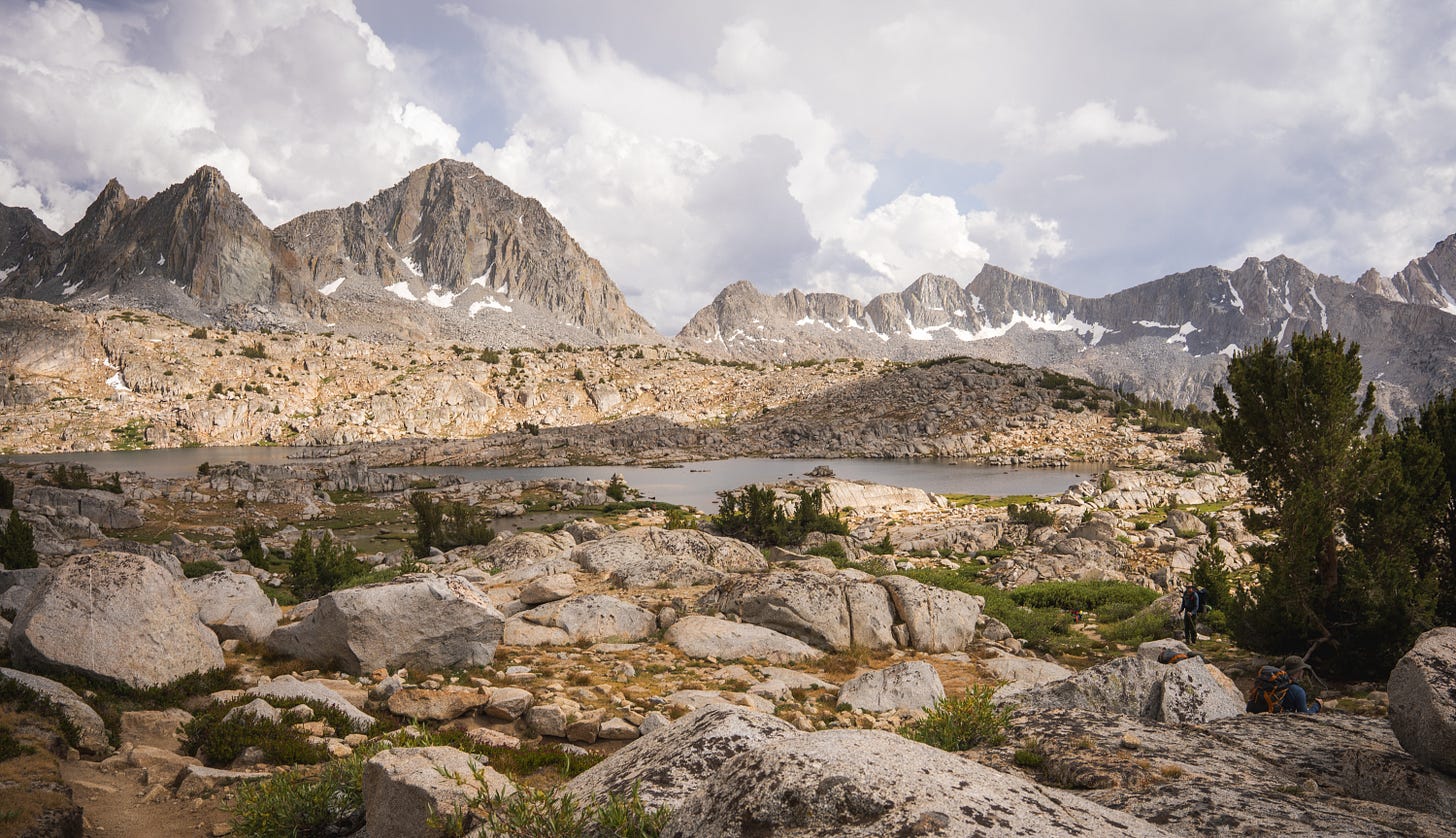
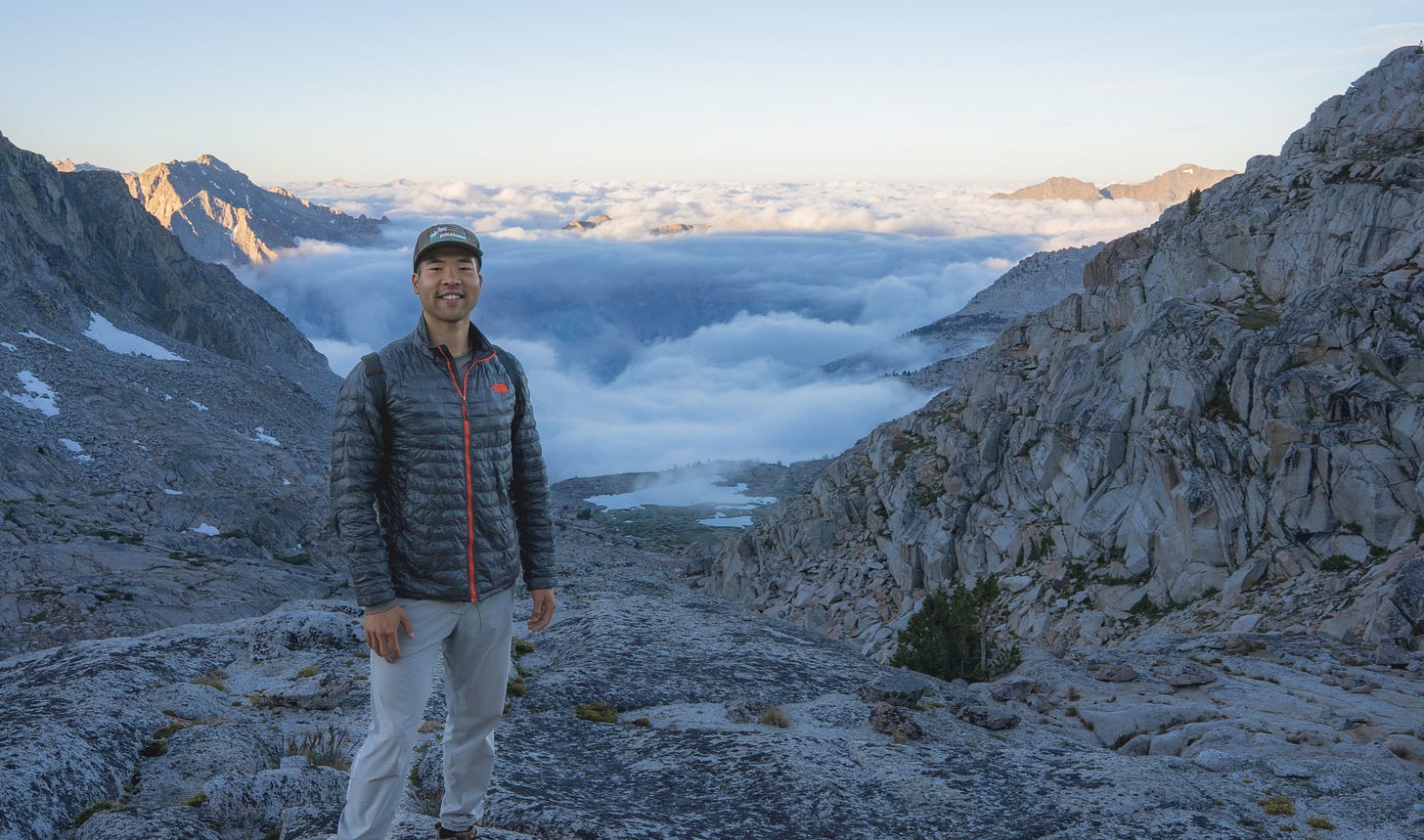
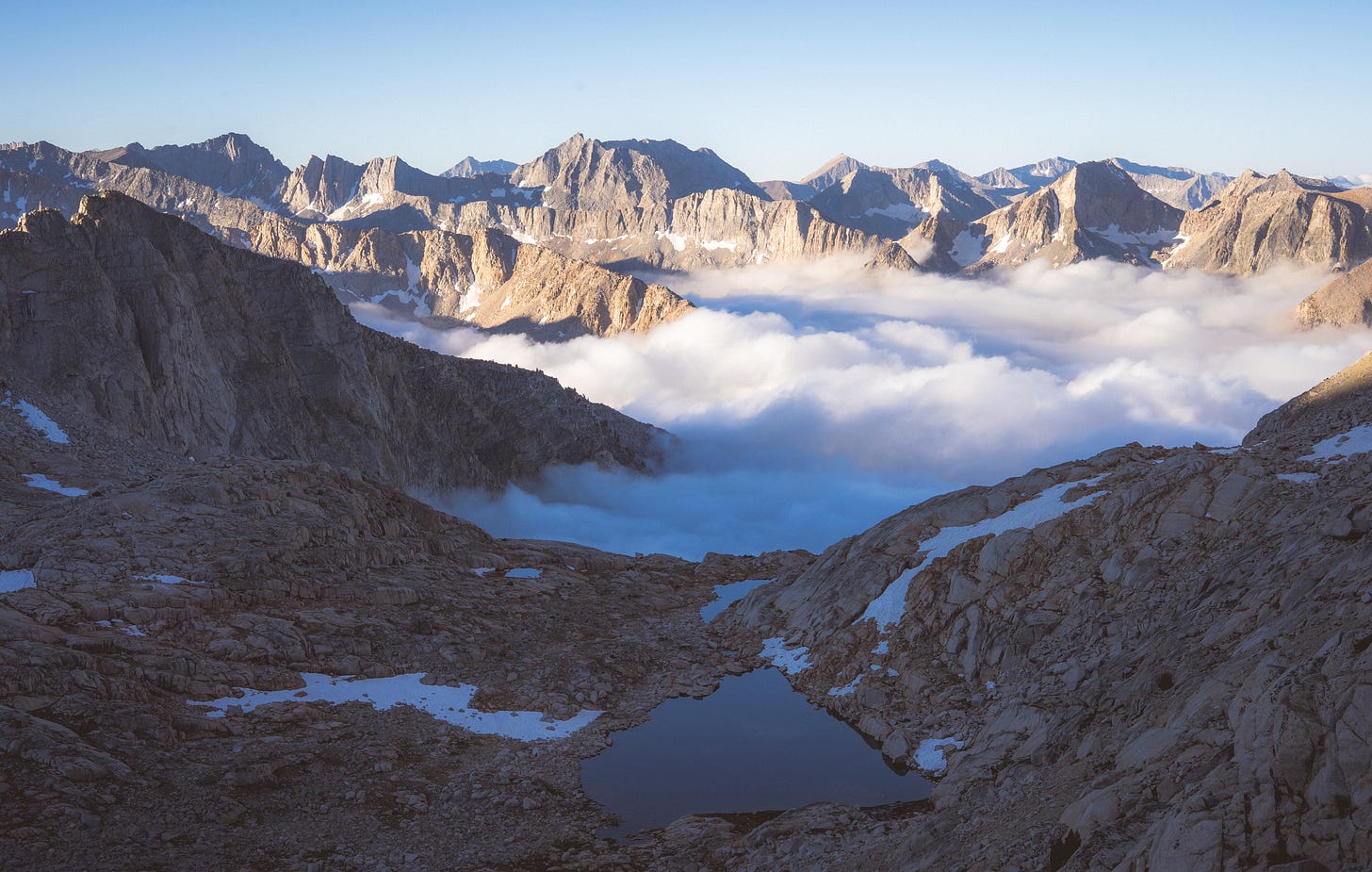
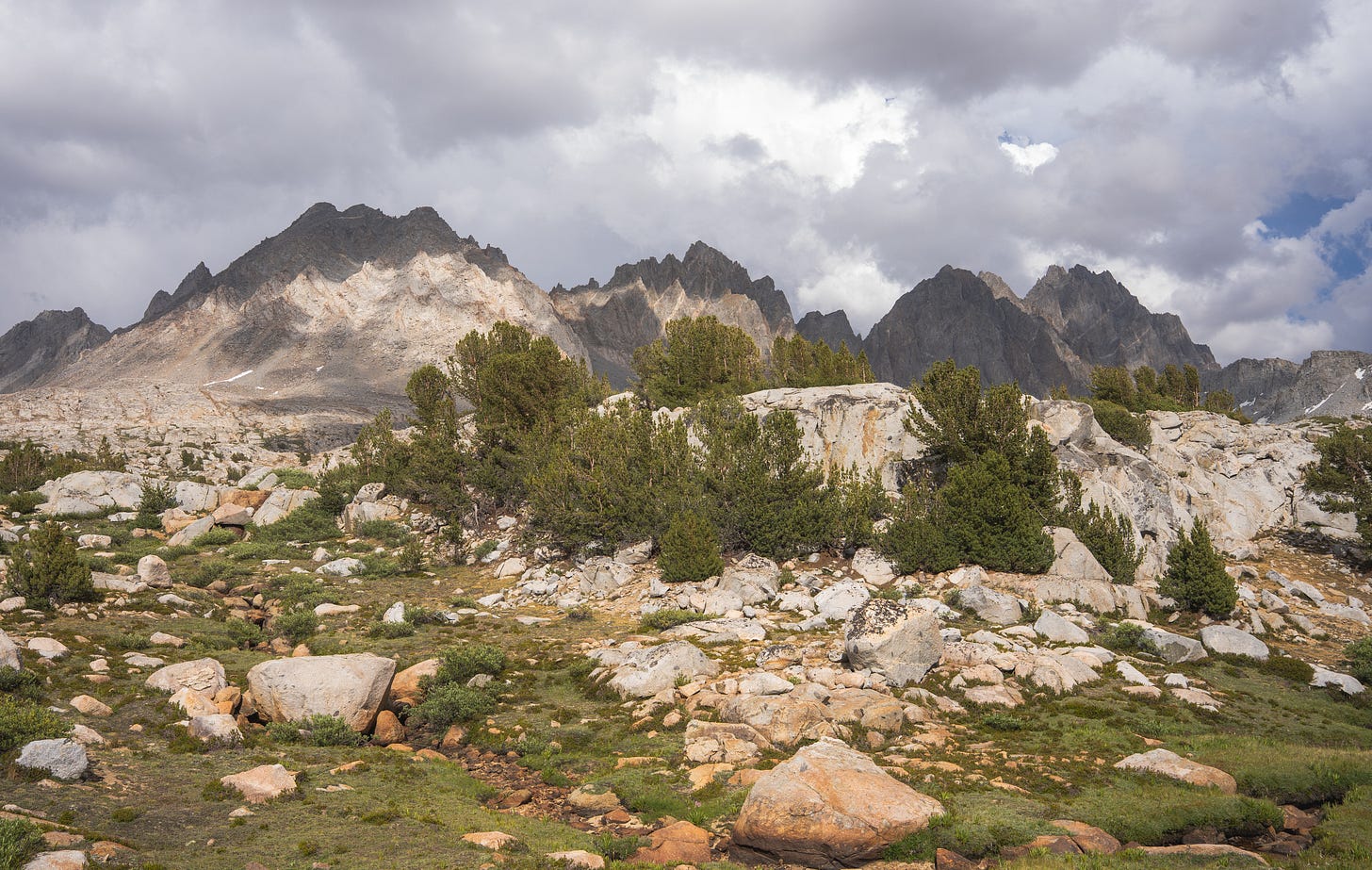
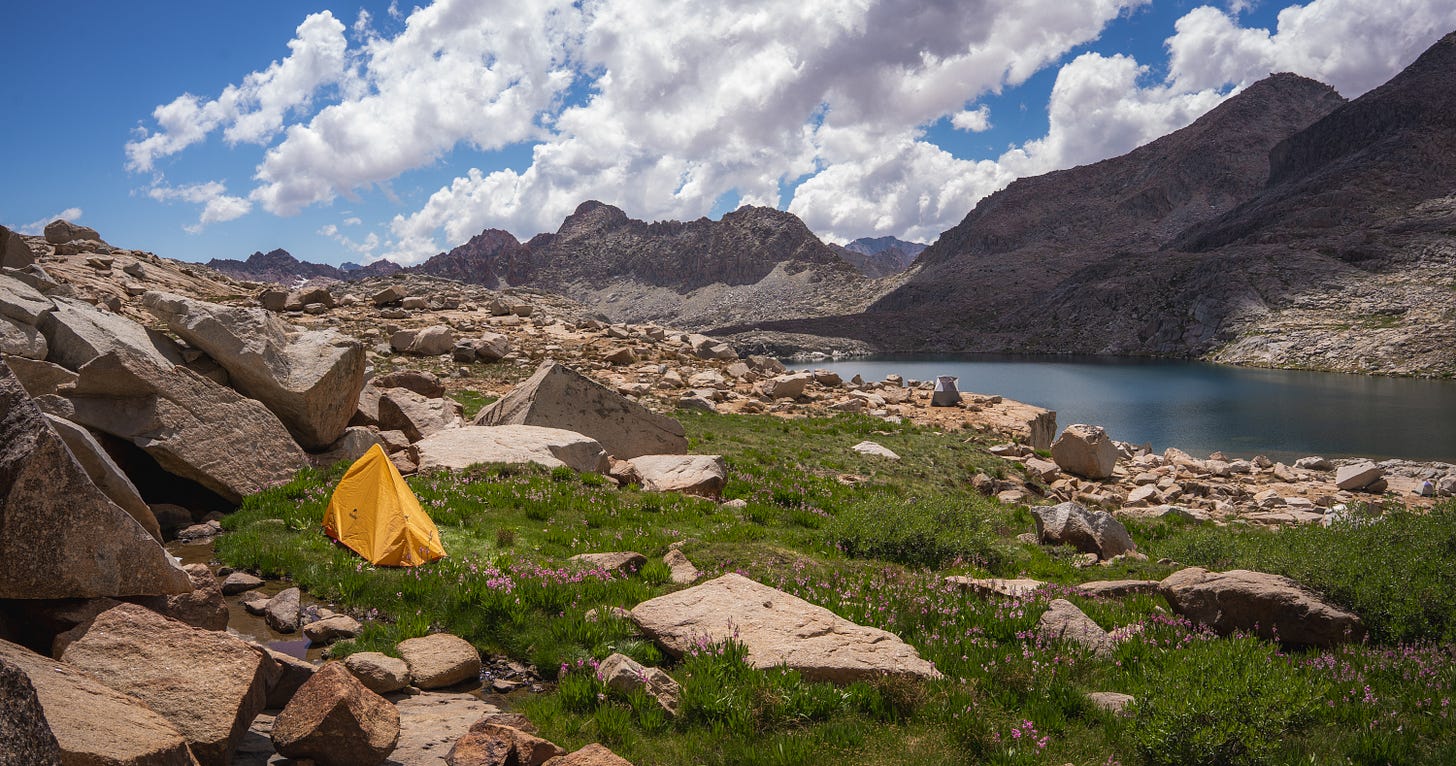
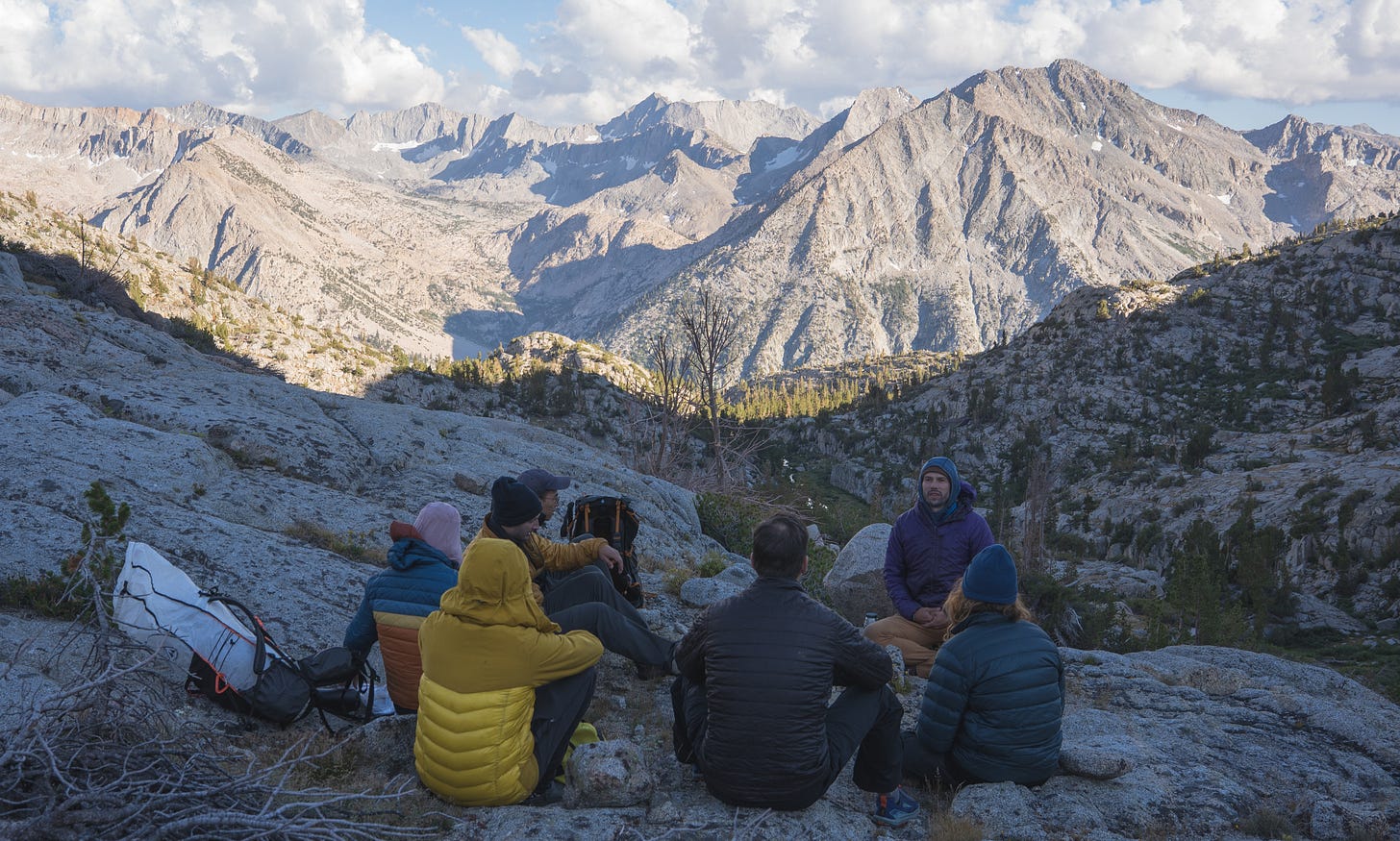
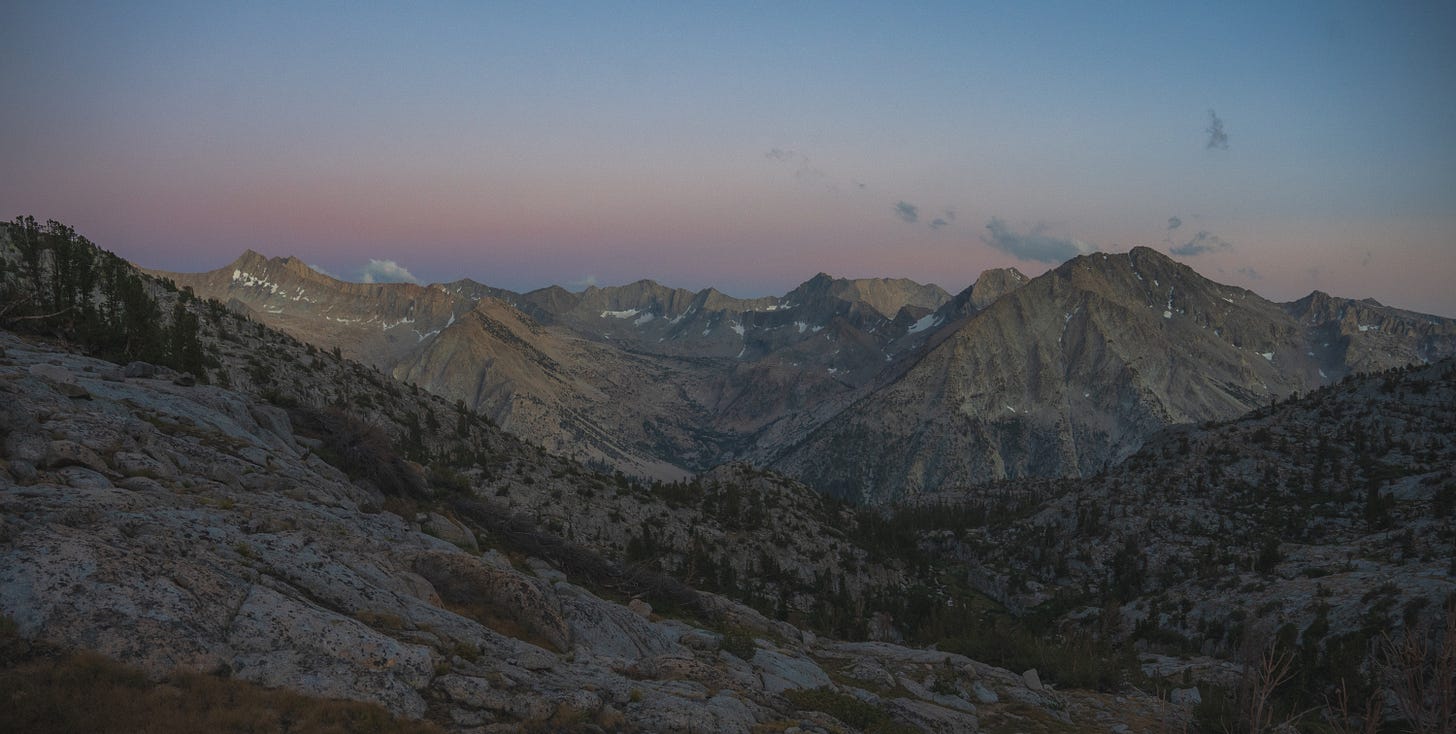
What a beautiful piece Matt.
Specifically this line is a resonant reminder "Money was created to make cooperation easier. But we don’t need money in order to cooperate. We can just help each other."
It reminded me of how I pack about 8 pounds of cheese as my main offering to the group on the Kalalau Trail and how trading that for my first-ever piece of a fresh jackfruit to a woman raising her child there (and rarely ever had dairy products) felt like the best win-win exchange ever. You've got me missing the backcountry and how life there works. Thank you. :)
Loved this! It’s inspiring me to think about the next time I may be able to get back out in the backcountry. I was able to go on my first backpacking trip last year (more here: https://rayliu24.substack.com/p/monthly-musings-june-edition)
Loved all the details. And specifically the part about everyone helping each other - “what I’ve noticed is that when people feel supported, they also become more willing to support others. It creates a positive flywheel. When you’re not worried about having enough, your attention shifts outward. You start looking for ways to contribute.”
At the end, I realized that I met Dom a few months back when I went to his SF Climate Week event haha